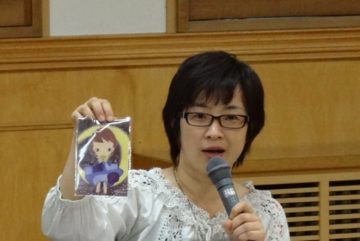Nobuki: In Tokyo, various sources of housing have been made available to evacuees. These include housing managed by the Tokyo Metropolitan and Ward Offices, as well as housing complex originally built for national public employees. In addition to these, the Government has designated selected privately managed properties as housing for evacuees. Next month, it would be two years since the evacuation. Because new housing is not yet completed in devastated areas, evacuees cannot be asked to move back. The Tokyo Metropolitan Government had no choice but to extend the term of stay for evacuees. However, the term remained as one that is to be renewed on an annual basis. It is not usual to live our lives one year at a time. There needs to be long term planning, especially for matters such as the children’s education. Yet, by not allowing for a longer term such as ten or at least five years, the Government is making them do just that. We have continued in making appeals to the Reconstruction Agency, the Ministry of Land and Transportation and several other ministries and agencies since 2011, but have not received longer periods of extension. Hence, it remains that temporary housing will be extended on an annual basis. In addition, the actual period is dependent on the rules and practices of the city or town we are in; and in Tokyo, the general rule for housing contracts is that a lease period starts from the month the tenant moves in and ends on the same month of the following year for a one-year contract.
Ms. K: Children who are at the age when they are preparing for entrance exams can no longer plan for their future. They might pass the exams for the schools of their choice, only to find that they will have to return to Fukushima.
Question: How many voluntary evacuees are there in Tokyo?
Nobuki: There is no official statistics for voluntary evacuees. The number is estimated to be one fifth of the number of Fukushima evacuees, which is 7,500 in total.
Ms. K: In that connection, during the time that I stayed at Akasaka Prince Hotel, total evacuees counted 800, among whom 400 were voluntary evacuees.
Nobuki: The Tokyo Metropolitan Government has not yet counted the number of children among voluntary evacuees. Although various volunteer groups ask local governments for whereabouts they live, the clerks won’t give us information. Even if they lived next door, one would not know that their neighbors were evacuees. They had been isolated for two years, while young mothers had raised their babies all alone. There is a communications network among mothers who stayed at Akasaka Prince Hotel. On the other hand, there are those who do not have any information, those who are not in a circle of evacuees, nor are they connected to any of the supporting groups. There were some who died solitary deaths. There are not many people who show interest or concern for the evacuees, and I am grateful for the opportunity to talk about their situation.
Question: I understand that legal action has been taken against the Japanese Government and TEPCO; which I think should take place. There are, I heard, conflict and friction among evacuees and non-evacuees. I think this is rather unfortunate. Among those who remain in Fukushima, there are many who are raising their children, too. I believe both groups of people have the same stance on the restart of the nuclear power plant and reliance on nuclear energy. For the sake of children, is there any cooperation between both groups regarding these concerns?
Ms. K: On March 11, we filed action, on a nation-wide basis, against the Japanese Government and TEPCO. We worked in co-ordination with groups in Minamisoma City, Iwaki City, Yamagata Prefecture and Chiba Prefecture. In the case of Chiba, evacuees were mostly from the Compulsory Evacuation Zone. On the other hand, in Iwaki, both evacuees and non-evacuees filed their action together. To be honest, they are afraid of legal action. It was only natural that they hesitated to join us as plaintiffs, as the opponents were the Japanese Government and TEPCO. I’ve never imagined that I would have something to do with lawsuits in my life. I’m sure that most people would think just like me. However, there are many who say “Don’t clamor too much! Otherwise, the Fukushima Prefectural Government may go all out to insist on our return to Fukushima therefore to live quietly.” Hence, we have not been able to gain more sympathizers. Everyone is afraid that they might be bullied and would not want to fight. We are not taking action for the sake of money. However, it’s more often than not that we are regarded as such and asked about the compensation we had received. Whether evacuated or not, we are suffering. We would like others to be able to understand this. We do not want this kind of disastrous consequences to be repeated. Yet, people ask us, “Do you want more money even after you have received compensation?” or “You act for money after all.” It worries us that there are various negative factors which hinder an increase of plaintiffs.

